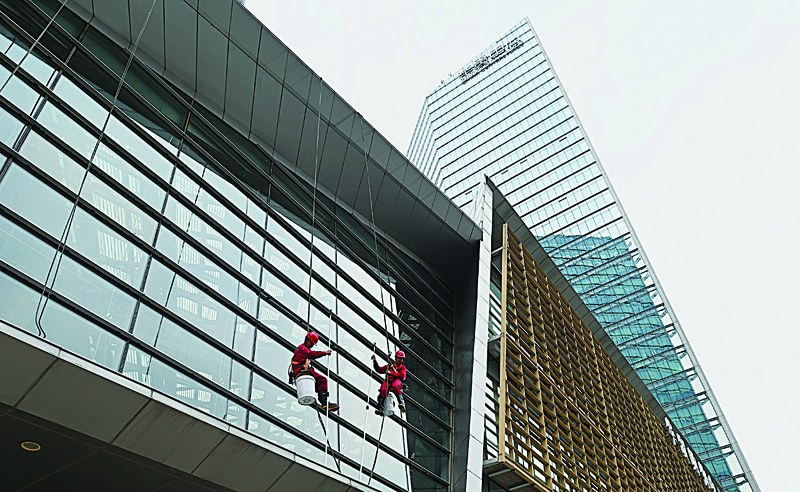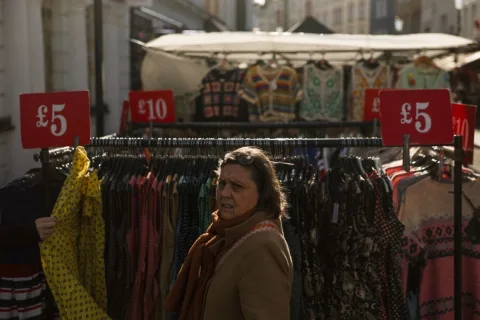 BEIJING: Workers clean the glass facade of a mall in Beijing yesterday.-AFP
BEIJING: Workers clean the glass facade of a mall in Beijing yesterday.-AFPBEIJING: China's top leaders plan to redistribute wealth, "adjust excessive incomes" and crack down on illicit gains in a bid to tackle inequality that could dent the fortunes of its richest, state media reported yesterday. The policy goal, announced in the readout from an economic planning meeting attended on Tuesday by President Xi Jinping, comes amid a sweeping push by Beijing to rein in the country's largest private firms in industries ranging from tech to education. It also follows a wider effort to alleviate poverty-a central pillar of Xi's leadership-and as rumblings from the state crescendo on the type of capitalism China wants to have.
The meeting of the Central Committee for Financial and Economic Affairs agreed that China should "make basic institutional arrangements on income distribution," raise incomes for people down the economic pyramid and "adjust excessive incomes and prohibit illicit income," the official Xinhua news agency reported yesterday. Xinhua said this was intended to "promote social fairness and justice".
The wealth gap in China is massive, with the top 10 percent of the population accounting for around 40 percent of national income in the last decade, according to a 2019 study in the American Economic Review. China does not currently have nationwide direct property taxes, and does not levy an inheritance tax.
The number of billionaires in China nearly doubled to more than 1,000 in the past five years, according to the Hurun Report. Meanwhile, the country's super wealthy became a record $1.5 trillion richer in 2020, including bottled water magnate Zhong Shanshan and Alibaba founder Jack Ma, even as ordinary people struggled to find jobs amid COVID lockdowns last year.
The country's largest private firms have in recent months been hit with new regulations and antitrust probes aimed at curbing their outsized influence on nearly every aspect of life in China, wiping out billions of dollars in shares. China's tax authorities have also in recent years cracked down on rampant tax evasion in the country, with film star Fan Bingbing's disappearance in a tax evasion probe in 2018 sparking national outrage on under-the-table payments received by the rich.
Meanwhile, Chinese tech giant Tencent's revenue grew at its slowest pace in two years, results released yesterday showed, as it and other gaming firms now brace for an expected regulatory crackdown. Total revenues came in at $42.3 billion for the first half of 2021, up 23 percent year on year while operating profits were up 17 percent.
Sales rose 20 percent to $21.3 billion for the second quarter while mobile games sales grew 13 percent. While the figures remain healthy, the growth rate has slowed closer to pre-pandemic levels. Gaming giants saw a boom in profits over the last year as the coronavirus swept the globe and kept consumers at home. But Chinese gaming firms now face new headwinds.
China's communist rulers have been cracking down on Big Tech and other powerful sectors deemed to be out of control with signs gaming is next in the firing line. The online gaming industry, which made revenue of 130 billion yuan ($20 billion) in the first half of this year, has been the subject of several menacing state media reports in recent days, with one article labelling such games "spiritual opium".
The negative headlines have fuelled concerns the sector is next in line for the regulatory axe, which has cut into large tech firms from e-commerce behemoth Alibaba to ride-hailing giant Didi Chuxing, hammering share prices. Last month, regulators ordered Tencent's music arm to relinquish exclusive licensing deals with a number of labels and quashed a potential merger of two rival game streaming platforms.
Earlier this month Tencent dropped bombshell curbs on play time, an early sign of broader industry changes to come. Players under 12, for example, can no longer make in-game purchases in multiplayer battle smash-hit "Honor of Kings", while under-18s are locked out after two hours during holidays and one hour on school nights. - AFP










